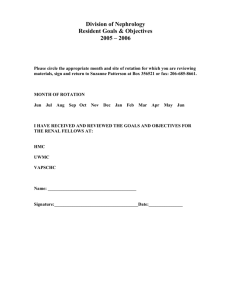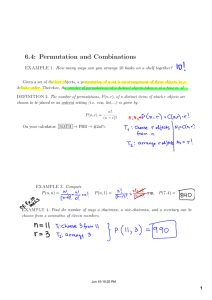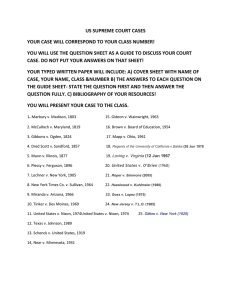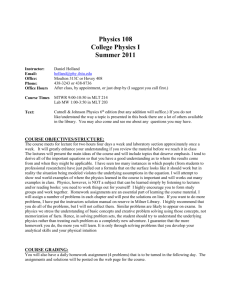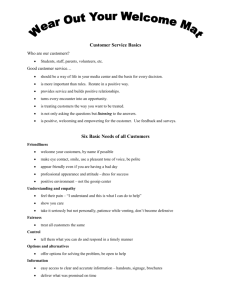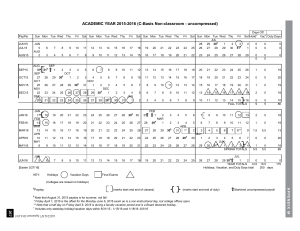BIOL15b - Cells and Organisms Summer Session 1 2015 Dr. Kene Piasta
advertisement
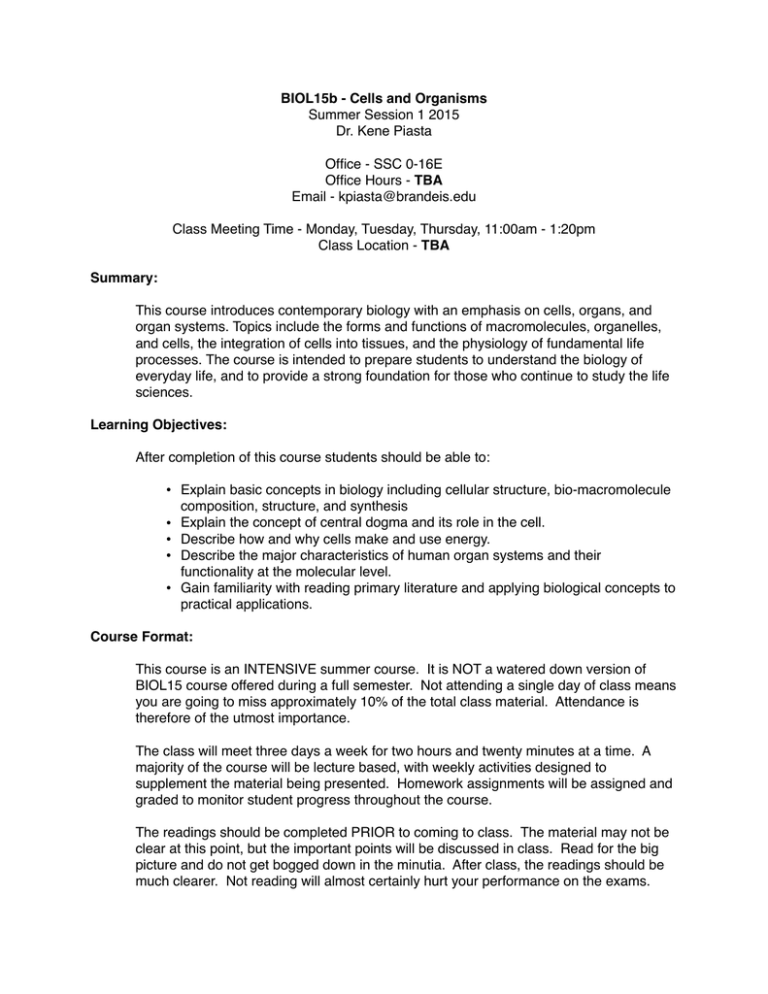
BIOL15b - Cells and Organisms Summer Session 1 2015 Dr. Kene Piasta Office - SSC 0-16E Office Hours - TBA Email - kpiasta@brandeis.edu Class Meeting Time - Monday, Tuesday, Thursday, 11:00am - 1:20pm Class Location - TBA Summary: This course introduces contemporary biology with an emphasis on cells, organs, and organ systems. Topics include the forms and functions of macromolecules, organelles, and cells, the integration of cells into tissues, and the physiology of fundamental life processes. The course is intended to prepare students to understand the biology of everyday life, and to provide a strong foundation for those who continue to study the life sciences. Learning Objectives: After completion of this course students should be able to: • Explain basic concepts in biology including cellular structure, bio-macromolecule • • • • composition, structure, and synthesis Explain the concept of central dogma and its role in the cell. Describe how and why cells make and use energy. Describe the major characteristics of human organ systems and their functionality at the molecular level. Gain familiarity with reading primary literature and applying biological concepts to practical applications. Course Format: This course is an INTENSIVE summer course. It is NOT a watered down version of BIOL15 course offered during a full semester. Not attending a single day of class means you are going to miss approximately 10% of the total class material. Attendance is therefore of the utmost importance. The class will meet three days a week for two hours and twenty minutes at a time. A majority of the course will be lecture based, with weekly activities designed to supplement the material being presented. Homework assignments will be assigned and graded to monitor student progress throughout the course. The readings should be completed PRIOR to coming to class. The material may not be clear at this point, but the important points will be discussed in class. Read for the big picture and do not get bogged down in the minutia. After class, the readings should be much clearer. Not reading will almost certainly hurt your performance on the exams. DO NOT let your reading lapse; the class moves too quickly for you to easily catch up once behind. If you have a documented learning disability and would like to have an accommodation made in taking this class, please inform me immediately. Academic Integrity: Students are expected to work independently on all homework and exams unless otherwise stated. Conduct inconsistent with the policies on academic honesty in "Rights and Responsibilities" will be treated seriously. http://www.brandeis.edu/studentaffairs/ srcs/rr/ Text Book: Biology: How Life Works. 2013. Morris, Hartl, Knoll and Lue. 1st ed. Freeman. Other readings may be assigned and will be posted to Latte. Grading: Your ultimate grade will be determined by homework problem sets, four cumulative exams, and your participation in class. The lowest exam grade will be dropped meaning your top three exam grades each will be worth 25% of your final grade, the homework problem sets will be worth 15%, and participation in class will be worth 10%. The problem sets are due at the beginning of class as set forth in the schedule. Absolutely no late problem sets will be accepted. Absolutely no exams will be allowed to be made up since the lowest grade will be dropped. Schedule: Date Topic Reading/Assingments Mon, Jun 1 Biology’s Building Blocks: DNA, RNA, Protein, Lipid, Chapter 1 Chapter 2 Chapter 3: 3.1 and 3.2 Tue, Jun 2 Replication Transcription Chapter 12: 12.1 and 12.2 Chapter 3: 3.3 and 3.4 Thu, Jun 4 Problem Set 1 Due Chapter 4: 4.2 Chapter 4: 4.1 Translation Protein Structure and Function Mon, Jun 8 EXAM 1 Energy and Thermodynamics Chapter 6: 6.1 - 6.4 Tue, Jun 9 Enzymes and Reactions Cellular Respiration Chapter 6: 6.5 Chapter 7: 7.1 Thu, Jun 11 Glycolysis acetyl-CoA Citric Acid Cycle (TCA Cycle) Electron Transport Chain Problem Set 2 Due Chapter 7: 7.2 Chapter 7: 7.3 Chapter 7: 7.4 Chapter 7: 7.5 Mon, Jun 15 EXAM 2 Cell Signaling Chapter 9: 9.1 and 9.2 Tue, Jun 16 Signal Transduction Chapter 9: 9.3 - 9.5 Thu, Jun 18 Problem Set 3 Due Chapter 10: 10.1 and 10.2 Chapter 10 : 10.3 and 10.4 Cytoskeleton Cellular Movement and Adhesion Mon, Jun 22 EXAM 3 Reproduction and Development Chapter 42 Tue, Jun 23 Digestion and Nutrition Chapter 40 Thu, Jun 25 Problem Set 4 Due Chapter 35 Nervous System Mon, Jun 29 Immune System Tue, Jun 30 Review Day Wed, Jul 1 EXAM 4 Chapter 43
